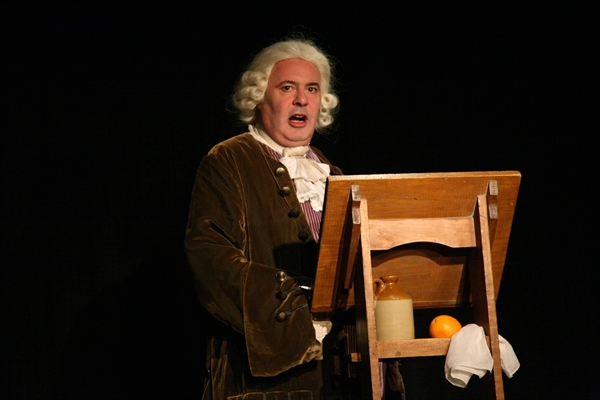@ Traverse Theatre, Edinburgh, until Sat 31 Oct 2015
The last of this year’s A Play A Pie and A Pint series is a lexicographer’s dream, particularly if that lexicographer is a Scots one. Dr Samuel Johnson may be known for putting together the first authoritative English dictionary, but his worker bees were nearly all Scottish. Thus in this brief portrayal of his life and work, the air is thick with throaty fricatives, rolling ‘r’s and sing song vowels as his co-workers beaver away at one of the most important books in history.
The existence of the Scots sidekicks, who Johnson (Mark McDonnell) treats with something approaching disdain, is just one of the things we learn about the man’s life. He was also unswervingly devoted to his wife (Gerda Stevenson), a woman twenty years his senior and in poor health. As an odd couple, they’re mocked in some quarters, yet he only has sweet words for her. This devotion, we’re led to believe, fuels the fire in his belly. Throwing himself into his work is the only way he can ease his grief when finally she departs this life.
Also, though in the popular imagination Johnson’s dictionary stands alone as the first, we learn there was something of a dictionary arms race going on. First the French, then a fellow Englishman beat him to the punch, but what marks Johnson out is his indefatigable pursuit of more and stronger definitions, draining his researchers (Simon Donaldson and Alasdair MacRae in multiple roles) to the point of exasperation.
When the focus falls on Johnson and his charges, the play trades in light Scots-baiting jocularity. ‘There’s much to be made of a Scotsman … if you catch them young enough.’ When it falls on him and his wife, it has tender moments.
Enjoyable though this is, the nuts and bolts of the piece are there for all to see. Johnson feels like a sketch from a history textbook, rather than a real 18th century man let loose amongst us. It leans toward re-enactment rather than interpretation. The emotions are there, but they’re observed rather than felt by the audience.
Also, while the musical interludes are pleasant, and there is some lovely hammered dulcimer playing by stand-in John Kielty, it’s not clear they serve a purpose beyond momentary diversion and an evocation of the period. Johnson was a man of words. Surely they should be allowed to shine.
As an educational piece, then, James Runcie’s play is both entertaining and enlightening. As biographical drama, though, it feels a little slight.


Comments